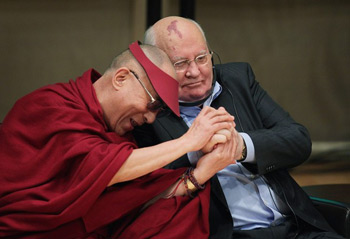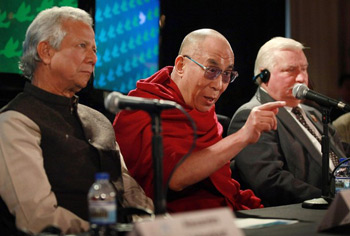
His Holiness the Dalai Lama and former Russian President Mikhail Gorbachev participate in a panel discussion during the 12th World Summit of Nobel Peace Laureates held in Chicago, Illinois, on April 25, 2012. Photo/Getty Images
His Holiness participates in the 12th World Summit of Nobel Peace Laureates
Chicago, Illinois, USA, 25 April 2012 – His Holiness the Dalai Lama began his morning program ias he met separately with President Lech Walesa, Jody Williams, and President Mikhail Gorbachev. They discussed issues of mutual concern, including issues taken up at the 12th World Summit of Nobel Peace Laureates. His Holiness said he regarded President Walesa as a hero as he stood firm against totalitarianism. His Holiness told President Gorbachev that he had single-handedly contributed to a change that had global impact. Kalon Tripa Lobsang Sangay, who is attending the Summit, was present in these meetings. Thereafter, His Holiness attended a luncheon for the participants of the Summit. In the afternoon, His Holiness was one of the panelists for a discussion on “World Peace and Nonviolence: Never Give UP.” His co-panelists were fellow Nobel laureates President Mikhail Gorbachev, Prof. Jody Williams and Prof. Muhammad Yunus. Before the session began, all the Nobel Laureates gathered on the stage as President Gorbachev presented actor Sean Penn with the 2012 Peace Summit Award. A video message from Aung San Suu Kyi was also screened. During the panel discussion, the moderator, Author Jim Wooten, asked the panelists questions that pertained to their background and how these connected with non-violence. He asked His Holiness about the future of Tibetan non-violent struggle in a post-14th Dalai Lama period. His Holiness began by explaining the historical background saying unless one understands this people will not realize the complexity of the issue. He talked of the period in 1949-50 when a new situation developed as a result of the Chinese takeover. He said prior to that period, international legal experts considered Tibet a de-factor state.
Subsequently, the Chinese preferred peaceful liberation and the 17 Point Agreement was signed with China, His Holiness said. He added that the Agreement in fact reflected the principle of One Country, Two Systems and the essence of the Middle Way Approach.
His Holiness said that from 1959, after coming over to India, some time was spent in looking after the rehabilitation of the Tibetan refugees. Then in 1974 when the Cultural Revolution was in full swing in China, the Tibetan leadership had taken a decision that we should be talking with the Chinese Central Government by adopting the Middle Way Approach, not seeking separation while changing the present situation. In 1978-79 His Holiness said the Chinese authorities sent a message to him that other than the issue of Tibetan independence anything else could be discussed. He said this complemented the thinking of the Tibetan leadership. Since then the Tibetan side had tried to carry on with this policy, with the situation being hopeful sometimes and difficult at others.
 |
|
His Holiness the Dalai Lama chats with Professor Jody Williams during a panel discussion at the 12th World Summit of Nobel Peace Laureates held in Chicago, Illinois, on April 25, 2012. Photo/Getty Images
|
However, His Holiness said there was no change in the situation inside Tibet. With reference to the Chinese attitude, His Holiness jokingly said that in a totalitarian system the people in authority had only mouth and no ears. They merely say what they want without wanting to listen. He recalled his meeting with Journalist Jonathan Mirsky of The Observer who asked him why the Chinese authorities did not like him. His Holiness responded by saying that this could be because he did not submit to the Chinese by agreeing to all their views saying, “Yes, Minister.”
His Holiness said while efforts have been made for 60 years to find a solution on Tibet with the Chinese, there has been no concrete outcome at the government level. However, he said that at the Chinese people level, given the opportunity to know the reality, they are showing interest in Tibet. He said this was because firstly, ours is a non-violent struggle and secondly because of our Middle Way Approach.
His Holiness then broadened his reference and talked about previous efforts by Nobel Laureates, led by Archbishop Desmond Tutu, on behalf of then imprisoned fellow Laureate Aung San Suu Kyi. He said now she is free. His Holiness said now another fellow Laureate Liu Xiaobo, who was recognized for his efforts on democracy, liberty, freedom, etc., is in prison. He suggested that the Nobel Laureates show solidarity and take up his case.
His Holiness also talked about the development of non-violence globally. He said the 20th century was a century of violence with one report of more than two hundred million people having been killed. He said that if the violence had some positive impact there could have been some justification. He now that we need to have a long term plan through education and raising awareness to promote a mindset that issues need to be solved through dialogue. He said this education needed to begin from the kindergarten level right up to university level. His Holiness said a peaceful world does not mean there will not be any problem. But all problems need to be solved through dialogue so that we can make the 21s century, a century of dialogue.
Following the discussion, His Holiness attended a press conference along with President Lech Walesa, Prof. Jody Williams, and others. He answered a few questions before departing for his hotel.
To a question about whether there will be a 15th Dalai Lama, His Holiness said that as early as 1969 he hade made it clear that whether the

His Holiness the Dalai Lama answers questions during a press conference flanked by Professor Muhammed Yunus (L) and former Polish President Lech Walesa (R) at the 12th World Summit of Nobel Peace Laureates held in Chicago, Illinois, on April 25, 2012. Photo/Getty Images
institution will continue or not will be up to the Tibetan people. He then recalled being asked a similar question by a journalist in Newark, New Jersey, and said he had responded by taking off his glasses and asking the journalist to judge from his composure whether there was a rush to think about the question now. His Holiness said in September last year Tibetan spiritual leaders of all Tibetan Buddhist traditions had discussed the issue of the reincarnation system of the Dalai Lama. His Holiness said he had issued a statement thereafter according to which when he reached around the age of 89 or 90 he would convened a meeting to find out whether the Dalai Lama institution was relevant or not and act accordingly.
When asked what would it take to resolve the Tibetan issue, His Holiness gave a historical explanation saying since 1974 the Tibetans had made up our find to find a solution through a Middle Way Approach and that when Chinese leader Deng Xiaoping sent a message in February 1979 about wanting to discuss any issue other than the independence of Tibet, our two positions were similar. His Holiness said he had been seeking for a meaningful solution since then and even did a survey of the Tibetan people’s views, including those living in Tibet. He said the majority, over 90 per cent, supported our position on the Middle Way. He said in 2001 there was a direct election of the Tibetan leadership and his position became that of semi-retirement. Last year, he said he had decided to have complete retirement and to end the nearly four centuries old tradition of the Dalai Lama holding both the spiritual and temporal leadership. He said his political authority was devolved to the elected Tibetan leadership. Then pointing to Kalon Tripa Lobsang Sangay who was present in the room, His Holiness said the Tibetan people have chosen him as their leader, who is born and educated in India and later in Harvard. His Holiness expressed his happiness at the development. He said that the Kalon Tripa had expressed his support to the Middle Way Approach.
To another question, His Holiness explained the reasons why we needed to promote a non-violent culture. He said that we must approach all issues through a realistic way, which meant that they have to be non-violent. He said involving in violence would only lead to a chain reaction of violence. He said therefore we needed to promote non-violence through promotion of inner values. His Holiness said now institutions in the United States, India, Europe and Japan have more and more experts thinking over these and added that he was therefore optimistic.
On April 26, 2012, His Holiness will address the Tibetan community, give public talks on non-violence as well as on interfaith dialogue, and address an event at Loyola University. http://www.dalailama.com/news/post/697-his-holiness-participates-in-the-12th-world-summit-of-nobel-peace-laureates